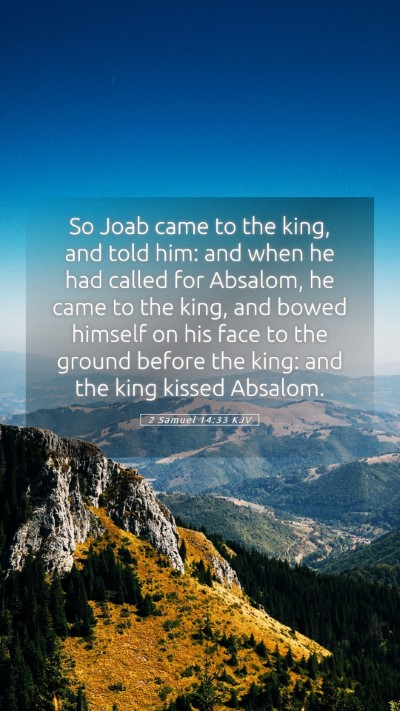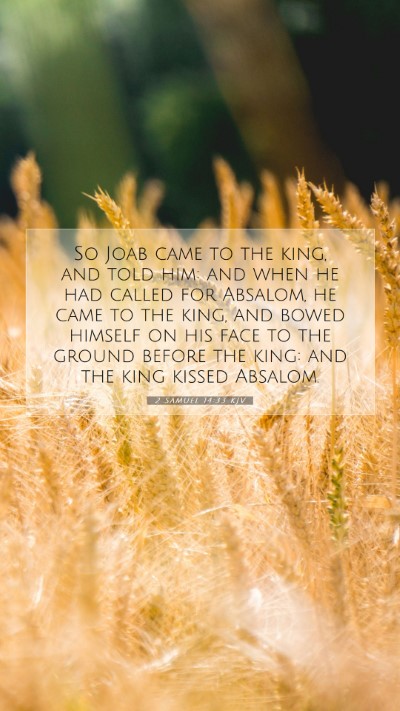Bible Verse Meaning: 2 Samuel 14:33
Verse: "So Joab went to the king and told him. And when he had called for Absalom, he came to the king and bowed himself on his face to the ground before the king. Then the king kissed Absalom." (2 Samuel 14:33)
Summary of Bible Verse Explanation
This verse concludes a significant narrative involving Absalom's return from exile and highlights themes of reconciliation, authority, and familial relationships. The interaction between Joab, King David, and Absalom signifies the complexities of leadership and the personal struggles of a king who grapples with his estranged son’s return.
Key Themes and Insights
- Reconciliation: The act of Joab bringing Absalom before David shows a movement toward reconciliation in a strained father-son relationship.
- Authority: David's role as a king is stressed through his power to pardon and embrace his son, highlighting the responsibilities of leadership.
- Emotional Depth: The act of kissing Absalom conveys a mixture of love, longing, and possible unresolved tensions.
Bible Commentary Insights
This interpretation draws on the thoughtful analyses of respected biblical commentators:
- Matthew Henry: Henry emphasizes the importance of Joab’s intercession, indicating that it was through Joab's wisdom and care that reconciliation was achieved, reinforcing the role of mediators in promoting peace.
- Adam Clarke: Clarke explores the deeper emotional state of David, reflecting on a father's struggle that resonates with anyone who has faced familial discord, signifying that personal relationships can greatly impact leadership.
- Albert Barnes: Barnes further underscores the implications of this reconciliation, suggesting that it may not only affect the personal sphere of the royal family but also the political landscape of the nation.
In-Depth Analysis
Understanding this verse involves looking at the broader biblical narrative. Absalom, who had previously committed acts against his father, David, is now willing to return, and Joab facilitates this reunion. This moment is pivotal as it addresses the human emotions behind royal duties.
Historical Context
In historical context, Absalom's rebellion had significant ramifications for the nation of Israel, setting the stage for further turmoil and showcasing the need for stability within the monarchy.
Cross References
- 2 Samuel 13:39: Discusses David’s mourning and yearning for Absalom.
- 2 Samuel 15:1-6: Highlights Absalom's ambitions and the subsequent strife within the kingdom.
- Luke 15:20: Parallels in the New Testament with the Prodigal Son narrative, showcasing themes of forgiveness and acceptance.
Applications for Daily Life
Believers can draw lessons from 2 Samuel 14:33 that apply to their lives:
- Recognizing the importance of reconciliation in personal relationships.
- Understanding the complex dynamics of leadership and the burden it carries.
- Embracing forgiveness, as exemplified by David’s willingness to reunite with Absalom.
Conclusion
2 Samuel 14:33 serves not only as a historical account but also as a profound lesson on the complexities of familial love and the grace of reconciliation. It encourages readers to explore the depth of human relationships and the teachings found within scripture. Through Bible study tools and resources, further insights can be gained, fostering an understanding of such pivotal moments in biblical narratives.
Engaging with Scripture
For those who wish to delve deeper, engaging in Bible study groups or utilizing online Bible study resources can provide a richer understanding of these themes and their applications within the context of faith today.


